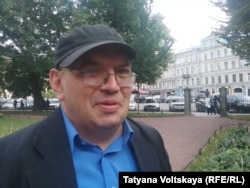In recent years, several Russian citizens have faced criminal charges for “extremism” due to posting or sharing things on social media. In some of these cases, the offending post was a joke or meme. In August 2018, Russia’s Mail.ru Group, an internet company which, in addition to hosting a web-based email service, also owns Russia’s largest social network VK.com, called for Russian authorities to change laws on extremism and grant amnesty to some of those who were convicted under the current strict laws.
On October 1, the Russian state news agency TASS reported that Alexander Kurennoi, spokesperson for the Russian Prosecutor General's Office, denied that a criminal case had ever been opened against someone for “liking” a post on social media. Kurennoi is almost correct. It appears that the majority of criminal prosecutions involving social media concerned people sharing or retweeting material, or because of something posted on their own page. However, there is at least one case where a person faced criminal charges because they “liked” a post.
In 2012, Vitold Filippov faced a criminal charge for promoting “fascism or Nazism” after liking a photo from the film American History X. The photo depicted the film’s lead character, a skinhead played by Edward Norton, who has a swastika tattoo on his chest. Filippov pointed out that this is a famous film that was regularly shown on Russian TV at the time. Luckily, the court dropped the criminal charge but he was still forced to pay a fine for the civil charge of “promoting Nazi symbols.”
Filippov pointed out that he only had “liked” the post, and that in 2011 VK automatically displayed liked posts on user’s own pages. He tried to have a computer expert explain this in court, but according to him the judge “refused to listen.” Because of this automatic feature, the difference between someone being charged because they simply “liked” a post and because they shared or posted something on their own page is negligible.
TASS reports on a recent development:On September 20, the Russian Supreme Court adopted a resolution stating that criminal cases for likes or reposts on social media will no longer be opened unless a motive can be established.
Earlier, on September 3, President Vladimir Putin proposed amendments to the law that would reduce criminal prosecutions for online “extremism,” although, as the independent Russian news outlet Meduza warned the reforms could “unleash a wave of new misdemeanor cases,” charges it said are easier for police to bring. Meduza also reported the changes “create yet another statute prohibiting activities by legal entities,” which already face bans on “abusing the freedom of the press.”
Another major flaw in the proposed law, according to lawyer Damir Gainutdinov from the legal aid center Agora, is that it still does not define the term "extremism," meaning that almost anything can fall under it. According to Russia’s Ministry of Internal Affairs, in the first half of 2018, there have already been 762 criminal cases for extremism.






